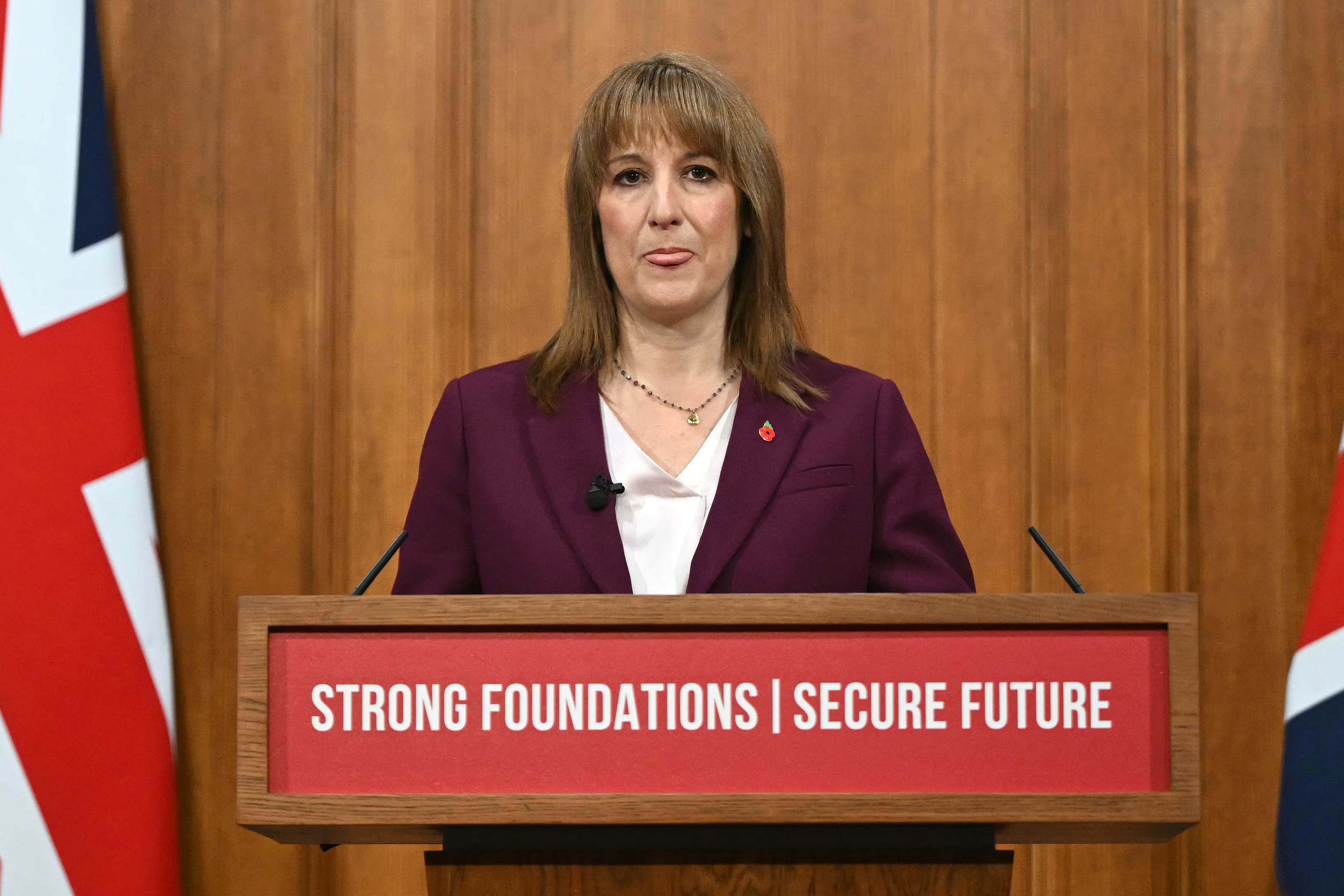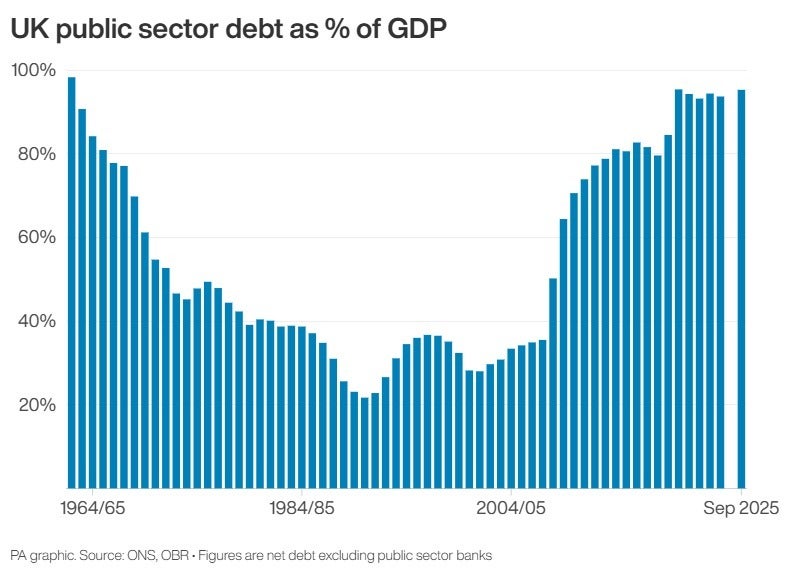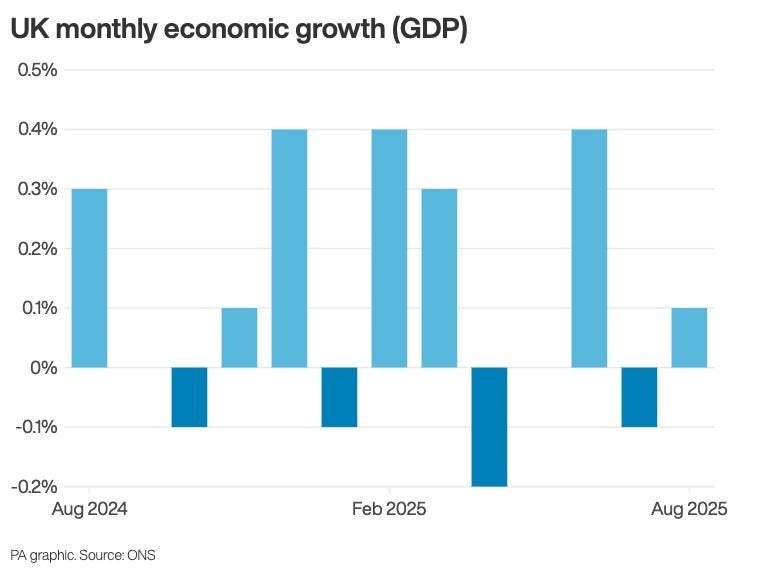Rachel Reeves has put the country on notice that sweeping tax rises are coming in her Budget, warning “we will all have to contribute” to building a new future for Britain.
Promising to put the national interest above “political expediency”, the chancellor signalled she is ready to break Labour’s manifesto commitment not to raise income tax, personal national insurance or VAT.
Instead, the chancellor said “each of us must do our bit” – her strongest indication yet that she will raise income tax across the board when she delivers the Budget on 26 November.
She blamed global problems such as Donald Trump’s tariff war and lowered economic forecasts for the “hard choices” she will make.
After the chancellor delivered her unprecedented pre-Budget speech:
- The pound fell to a six-month low against the dollar
- Tory leader Kemi Badenoch dismissed it as “one long waffle bomb”
- Chancellor ruled out “going down the path” of austerity
It comes as Ms Reeves scrambles to fill a black hole of up to £50bn in the public finances while keeping to her golden rule of funding day-to-day spending with tax receipts.
“I will do what is necessary to protect families from high inflation and interest rates, to protect our public services from a return to austerity and to ensure that the economy that we hand down to future generations is secure with debt under control,” she said.

“If we are to build the future of Britain together, we will all have to contribute to that effort.
“Each of us must do our bit for the security of our country and the brightness of its future.”
But a former key adviser to Ms Reeves warned her that hiking income tax might not be enough.
Former Treasury minister Jim O’Neill said the markets had interpreted her speech to mean “the manifesto pledge is going to be broken and taxes are going to go up”.
But he warned that if raising income tax was “the only big thing that’s coming, it won’t be long before the markets start to worry again [that] the UK is not getting any growth of substance … and what are they [ministers] going to do next?”
He called for extra measures in the Budget, including “any of, if not all of, serious property tax reform, the end of the triple lock [on pensions], welfare reform, really being even more ambitious about reform of the NHS and using technology to dramatically improve the effectiveness of all government services”.
It came as a leading economic think tank warned that the chancellor will need to hike the basic rate of income tax by at least 2p in order to plug what it estimates is a £50bn black hole in the public finances and avoid a “fiscal doom-loop”.
A major report from the National Institute of Economic and Social Research (NIESR) warned that the chancellor is on track to miss her “stability rule” by £38.2bn in 2029-30, one of the government’s two fiscal rules which requires the government's day-to-day spending to be met by tax revenues.
The Office for Budget Responsibility (OBR) is expected to predict a smaller deficit of around £20bn when its latest forecasts are published alongside the Budget. But the NIESR urged Ms Reeves to aim for a buffer of at least £30bn on top of the OBR’s forecasts in order to restore stability.
Instead of “messing around” with changes to marginal taxes, the think tank said the chancellor will probably need to break her manifesto pledge not to hike taxes on working people in order to avoid more long-term economic damage.
It said a 2p increase to the 20 per cent basic rate of income tax, which would raise around £20bn, is the minimum needed to plug a hole in the battered public finances, while a 5p rise on the 40 per cent rate would raise an extra £10bn. Around £500m would be raised from a similar hike to the upper band, it added.

The Office for Budget Responsibility (OBR) is expected to heavily downgrade its previous forecasts for productivity, adding to the chancellor’s headaches and leaving a black hole of around £20bn in the public finances.
Ms Reeves said that “it is already clear that the productivity performance that we inherited from the last government is weaker than previously thought”, which “has consequences for the public finances” in terms of lower tax revenue.
The OBR’s review of productivity is likely to be “the most impactful thing in the Budget, in terms of the change in the fiscal and economic outlook”, she said.
The chancellor also wants to give herself a bigger buffer than the almost £10bn she previously had against her rule of balancing day-to-day spending against tax receipts in 2029-30.
That has led to speculation she will be forced to increase one of the big revenue-raising taxes, previously ruled out in the manifesto.
Ms Reeves repeatedly declined to confirm she will stick to the manifesto commitment, telling reporters: “We’ve got to do the right things. The problem of the last 14 years is that political expediency always came above the national interest, and that is why we are in the mess that we are in.”
She said she had been appointed chancellor “not to always do what is popular, but to do what is right”.
That would mean a focus on “cutting NHS waiting lists, cutting the national debt and cutting the cost of living”.
She later defiantly insisted she would not resign if she had to raise taxes in the Budget. She told LBC: “I am not going to walk away because the situation is difficult. I was appointed as chancellor to turn our economy around, and I’m absolutely determined to finish that job.”

If Ms Reeves does rip up the manifesto and increase the basic rate of income tax, she would be the first chancellor to do so for 50 years.
MPs in Ms Reeves’s own party are increasingly concerned. One Labour backbencher told The Independent: “The chancellor’s press conference has created a doom loop countdown – with every day between now and the Budget being full of speculation – with consumers and businesses putting off spending while they wait and see. What’s obvious is Rachel has decided she never wants to be the PM, and is likely to be a one-term chancellor only.”
Shadow chancellor Sir Mel Stride said Ms Reeves should pay for any tax rises with her job.
“Rachel Reeves has made an emergency speech because she is panicking about the speculation she has fuelled,” he said. “But all she’s done is confirm the fears of households and businesses – that tax rises are coming.”
Reform UK deputy leader Richard Tice said: “Rachel Reeves has today confirmed what we all knew – she’s going to hammer working people with even more tax rises. Instead of cutting waste and spending, deregulating and optimising for growth, we are just getting more of the same.”
Ms Reeves later rejected Tory claims she was responsible for Britain’s economic problems. At Treasury questions in the Commons, she said Labour had found a £22bn black hole when it took office last summer and said the reserve for emergencies had already been spent four times over just three months into the financial year.
In a highly symbolic snub, Sir Keir avoided the annual Labour SME (small and medium-sized businesses) dinner for the first time since becoming leader.
Ms Reeves and business secretary Peter Kyle also did not attend, and the main speaker was former business secretary, now chief whip, Jonathan Reynolds.
Guests at the event expressed surprise, given that in previous years the party leadership has prioritised the event as part of its “pro-business drive”. With the Budget just three weeks away, one business representative at the event said: “It is a pity the prime minister is not here. If he was here, it would show he is genuinely pro-business.”
Government faces questions over tax rises after Reeves warns all must contribute
Income tax hike of at least 2p likely needed to plug Budget hole, warns Niesr
UK economy ‘bleeding out’ with brain drain in science and tech, peers warn
Firefighters call for funding boost as they prepare for Bonfire Night
UK ‘sliding into avoidable crisis’, major review into workplace sickness warns
Starmer affirms UK commitment to climate action ahead of Cop30 summit







